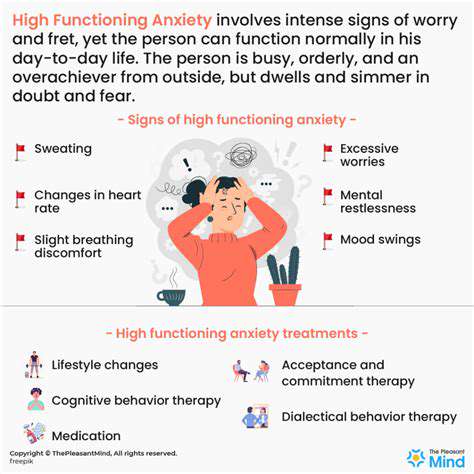Identifying Signs of High Functioning Anxiety
What is High-Functioning Anxiety?

Understanding the Concept
High-functioning anxiety isn't just about excessive worry—it's more nuanced than that. This particular form of anxiety often flies under the radar because those experiencing it tend to maintain an outward appearance of competence and success. Behind this facade, however, lies a constant undercurrent of tension and apprehension that drives their behavior. The paradox of high-functioning anxiety is that it enables people to function in society while simultaneously eroding their mental health.
Many individuals with this condition manage to excel in their careers, nurture relationships, and present a picture-perfect life to the world. Yet internally, they're grappling with persistent anxiety that colors every aspect of their existence, diminishing their joy and satisfaction.
Symptoms and Characteristics
Identifying high-functioning anxiety requires understanding its subtle manifestations. Those affected typically find themselves caught in a cycle of endless planning and preparation, driven by an overwhelming fear of potential mishaps. This hyper-vigilance often leads to mental exhaustion and an inability to truly unwind.
Physical manifestations like tension headaches, clenched jaw muscles, and restless nights frequently accompany the psychological symptoms. Decision-making becomes particularly challenging as every choice feels weighted with potential consequences.
Impact on Daily Life
The ripple effects of high-functioning anxiety extend into all areas of life. Personal relationships may suffer as the constant internal turmoil creates barriers to genuine connection. Partners and friends might misinterpret the anxiety-driven behaviors as disinterest or aloofness.
In professional settings, the drive for perfection can paradoxically undermine performance, as excessive preparation and second-guessing consume valuable time and energy. This can create workplace tension and limit career advancement opportunities.
Distinguishing It from Other Conditions
While high-functioning anxiety shares characteristics with other anxiety disorders, its defining feature is the ability to maintain surface-level functioning. Unlike generalized anxiety disorder where symptoms might be more visibly debilitating, individuals with high-functioning anxiety often appear to have everything under control.
Accurate diagnosis requires careful evaluation of how the anxiety manifests in relation to the person's overall life functioning. Mental health professionals use specialized assessment tools to differentiate between similar conditions and tailor treatment accordingly.
Coping Mechanisms and Strategies
Effective management of high-functioning anxiety involves developing personalized coping strategies. Grounding techniques and structured relaxation practices can help interrupt the cycle of anxious thoughts. Creating realistic schedules with built-in buffers can reduce the pressure of perfectionism.
Physical self-care—including regular movement, balanced nutrition, and consistent sleep patterns—forms a crucial foundation for anxiety management. Equally important is cultivating a support system of understanding friends or joining peer support groups.
Seeking Professional Support
Consulting with a mental health specialist represents a significant step toward managing high-functioning anxiety. Therapists can help uncover the root causes of anxiety while teaching practical cognitive-behavioral techniques. Many find that a combination of talk therapy and mindfulness-based approaches yields the best results.
The therapeutic environment offers a judgment-free space to explore anxiety patterns and develop personalized coping toolkits. For some individuals, temporary medication management might be recommended as part of a comprehensive treatment plan.
The Importance of Self-Compassion
Developing self-compassion proves transformative for those with high-functioning anxiety. Recognizing that anxiety doesn't equate to personal failure helps break the cycle of self-criticism. Small daily practices of self-kindness can gradually shift one's relationship with anxious thoughts.
Embracing the reality of human imperfection allows for healthier expectations and reduces the exhausting pursuit of flawless performance. Remember that seeking help demonstrates wisdom and courage, not deficiency.
Recognizing the Common Symptoms
Physical Symptoms
The body often signals high-functioning anxiety through various physical channels. Many experience chronic muscle tension, particularly in the neck, shoulders, and back. Digestive disturbances—ranging from mild discomfort to more severe gastrointestinal issues—are common physical markers. The constant state of low-grade stress can also manifest as persistent fatigue despite adequate rest. These somatic symptoms frequently serve as the first indicators that anxiety may be present.
Cognitive Symptoms
The mental landscape of high-functioning anxiety features characteristic thought patterns. A relentless stream of what if scenarios plays through the mind, making concentration difficult. Many describe feeling mentally exhausted from the non-stop internal dialogue. Sleep disturbances often result from this cognitive hyperactivity, creating a vicious cycle of fatigue and increased anxiety. Recognizing these thought patterns as anxiety-driven rather than reality-based represents an important step in management.
Behavioral Symptoms
Behavioral manifestations of high-functioning anxiety often revolve around control mechanisms. Excessive list-making, over-preparation, and difficulty delegating tasks all serve as attempts to manage underlying anxiety. Avoidance behaviors—whether procrastinating on tasks or declining social invitations—provide temporary relief but ultimately reinforce anxiety patterns. These behaviors frequently create additional stress as responsibilities pile up or relationships become strained.
Emotional Symptoms
The emotional toll of high-functioning anxiety can be particularly challenging. A persistent sense of impending doom colors daily experiences, even in objectively positive situations. Many report feeling emotionally drained from maintaining their together exterior while battling internal turmoil. Self-doubt and harsh self-criticism frequently accompany these emotional experiences, creating additional layers of distress.
Social Symptoms
Social interactions present unique challenges for those with high-functioning anxiety. The fear of being found out as anxious or inadequate can lead to social withdrawal. Many experience exhaustion after social engagements from the effort of maintaining their composed facade. Over time, this can lead to isolation and loneliness, despite the individual's genuine desire for connection. Recognizing these social patterns helps in developing more authentic ways of relating to others.
